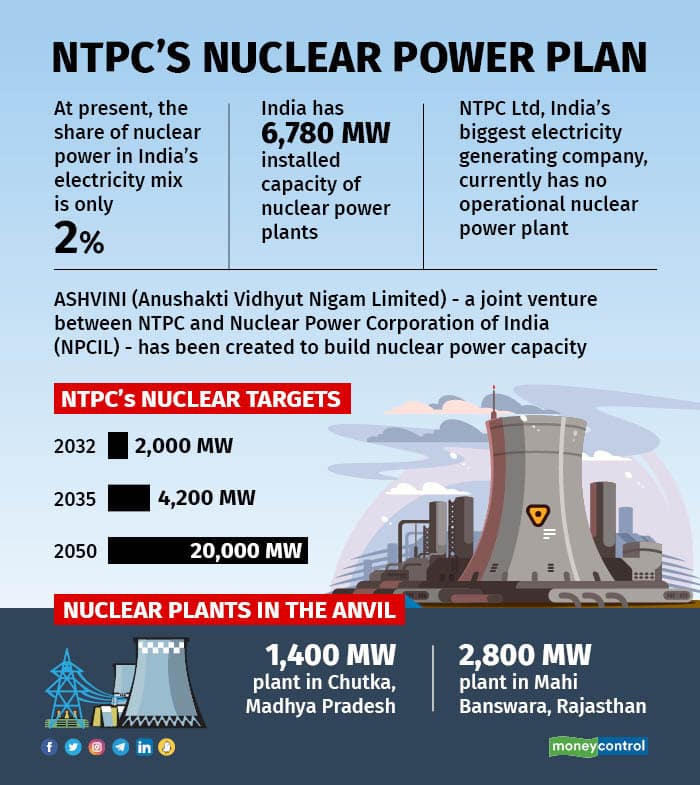



NTPC Ltd. signed a supplementary joint venture (JV) agreement with Nuclear Power Corporation of India Ltd. (NPCIL) on May 1 for the development of nuclear power projects in the country.
“Initially, the JV company shall develop two pressurised heavy-water reactor (PHWR) projects - Chutka Madhya Pradesh Atomic Power Project (2x700 MW) and Mahi Banswara Rajasthan Atomic Power Project (4x700 MW), which were identified as a part of fleet mode nuclear projects,” NTPC said in a statement.
On February 13, Moneycontrol was the first to report about NTPC's plan to expand India's nuclear power projects. NTPC, India's largest power producer, aims to start generating 2,000 MW of nuclear energy by 2032, 4,200 MW by 2035 and eventually scale up to 20,000 MW by 2050.
 Nuclear power plant of NTPC
Nuclear power plant of NTPC
Apart from capacity addition through pressurised heavy water reactors (PHWR), NTPC is also planning to add nuclear capacity through small modular reactors. It also intends to do fuel tie-ups with Uranium Corporation of India Ltd to ensure requisite feedstock availability.
The government has given approvals to install 10 nuclear reactors to meet the country's growing power demand, Union Minister of State (independent charge) Earth Sciences, Atomic Energy and Space, Jitendra Singh told the Parliament on April 5.
These reactors will be set up in ‘fleet mode’ progressively by the year 2031 at a cost of Rs. 1,05,000 crores. A total of 7,000 megawatts (MW) or 7 gigawatts (GW) is expected from these reactors. The 10 reactors will be installed at four locations - two each at Kaiga (Karnataka), Gorakhpur (Uttar Pradesh) and Chutka (Madhya Pradesh), while four will be at Mahi Banswara (Rajasthan).
Of these, the Chutka and Mahi Banswara nuclear projects will be implemented through ASHVINI - a joint venture between NTPC Ltd and NPCIL. The approximate cost of the Chutka plant will be Rs 25,000 crore and Rs 50,000 crore for the Mahi Banswara plant.
“This supplementary joint venture agreement marks a pivotal step for NTPC Ltd. and NPCIL to collaborate and cooperate in the field of development of nuclear power projects, which shall help the country in meeting its clean energy commitments to achieve net zero emission target by 2070,” NTPC said.
As per, Central Electricity Authority data, India has an installed nuclear power capacity of 6,780 MW, which is just 2 percent of the total energy (thermal, hydro, renewables) mix in the country.
Nuclear is a zero-emission clean energy source. It generates power through fission, which is the process of splitting uranium atoms to produce energy. The heat released by fission is used to create steam that spins a turbine to generate electricity without the harmful by-products emitted by fossil fuels.
Discover the latest Business News, Sensex, and Nifty updates. Obtain Personal Finance insights, tax queries, and expert opinions on Moneycontrol or download the Moneycontrol App to stay updated!
Find the best of Al News in one place, specially curated for you every weekend.
Stay on top of the latest tech trends and biggest startup news.